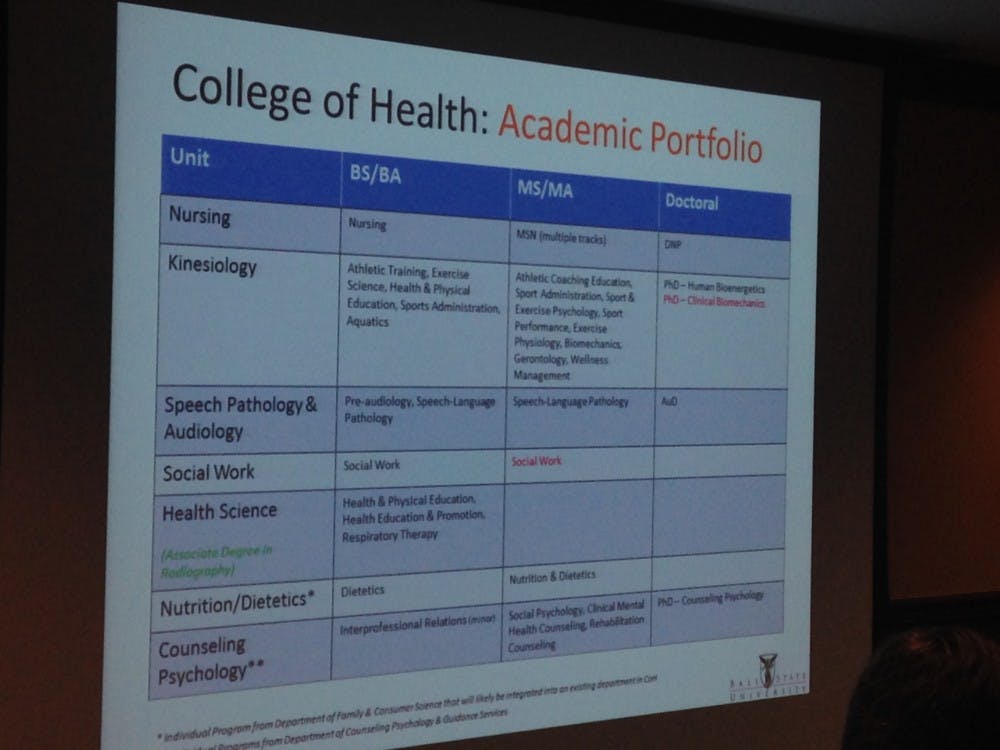3:24
Trustee Frank Hancock addressed the students who came to the meeting at the end.
"Seeing people coming to a meeting is really good," he said. "I'm really happy to see you here, and I'm really happy you didn't get up and leave as soon as your leader spoke."
He encouraged students to come to the board meetings in the future. If students thought this meeting was fast, it was because they missed the four hours of meetings before this, he said.
"I welcome you to come, find out what's going on," Hancock said. "It's good to know.
"It's a lot more transparent than people understand. There's stuff you can say in public, and there's stuff you can't. That's not a cop-out, that's just how it is."
The board also approved the minutes from Dec. 18 and Jan. 15, the day former President Paul W. Ferguson resigned. They also quickly reviewed what was discussed in committees. The regular session lasted about 30 minutes.
Students can check out the agendas for upcoming Board of Trustees meetings 48 hours in advance in the Administration Building's lobby.
3:10 p.m.
Trustee Chairman Rick Hall started off the meeting by addressing the larger-than-usual crowd.
Hall said he wanted to assure students and faculty and everyone at the meeting that the decision about President Paul W. Ferguson's resignation was mutual. But he acknowledged the many questions and discussions going on around the university.
"I want to assure you that there's no scandal, no other shoe going to drop, no financial crisis, no emergency going to be revealed next week," Hall said. "This was a personnel decision, and like all personnel decisions, there's a desire to respect the privacy of individuals involved."
Just as the university would respect students and their records, Hall said the board wanted to respect Ferguson's privacy in this matter.
"It's not a desire in any way for this board to act in a way that's inconsistent with transparency," Hall said. "Our university system is governed with great transparency at every level."
However, Hall said he was glad to hear students' thoughts, and he welcomed students to speak their mind at the meeting.
"We all share pride that some of our students have taken the time to come here and share views on this, that they think this is important," Hall said. "We're eager to hear what they have to say."
Carli Hendershot, a senior political science major who organized a peaceful sit-in at the meeting, was the only one who spoke.
Hendershot said the situation the board created has the potential to damage the university's reputation and its relationship with students and the community.
"The lack of transparency calls into question their legitimacy," she said. "The response we've received is inadequate, as a public university. The board needs to be open for discussion to clarify. There's too much money behind this, too much secrecy and not enough discussion."
Hall said he was happy to hear student thoughts — that hearing those thoughts was consistent with the approach the board has been taking since Jan. 25 when Ferguson resigned.
"I want to share with students the same message I shared with constituents and stakeholders," Hall said. "The university is moving forward, we have so much positive going on on this campus right now.
"I know there's been concern or question expressed from all different levels — does the board really get that? Absolutely we do."
Hall said he gets that students may have concerns — that they may be wondering if this change in leadership is evidence that the board wants to take the university in another direction.
"But that's not the case," he said. "We believe in what faculty and administration have accomplished and we have great pride and want to continue it."
10:19 a.m.
The Finance, Facilities and Planning committee meeting was a quick one — only four minutes. Bernie Hannon, vice president for Business Affairs and treasurer, read the same investment report he did in the first meeting.
Check back here at 3 p.m. when we are again allowed into the meetings.
10:05 a.m.
Amy Harden, chairperson of the University Senate, said there is still some unease in faculty after President Paul W. Ferguson's resignation, but the email acting President Terry King sent Jan. 28 reassured them.
10:03 a.m.
Julie Hopwood, interim vice president for strategic communications, said the university is up 9 percent in applications from this time last year, and up 10 percent in confirmations.
For the diversity requirements the university is working on, admission for African American students is up 25 percent, admission for Asian students is up 13 percent and admission for Hispanic students is up 29 percent.
Confirmations are up 8 percent for African American students, 5 percent for Asian students and 29 percent for Hispanic students.
9:55 a.m.
It's been about two years since Kay Bales, vice president for student affairs, introduced the Ball State Achievements application.
This app is targeted at students on the Pell Grant, a federal grant for students who have high financial need.
The app is trying to increase graduation and retention rates of Pell Grant students, because their retention rates are 6-8 percentage points lower than other students, Bales said. A third of the incoming freshman class each year are Pell Grant recipients.
In the first year of the program, retention rates went up from 73.3 percent to 76.4 percent.
In the app, students can complete tasks and activities to get "Bennies" — the currency for the app — that they can exchange for real-life products, like apparel and tickets.
As of January 2016, the app has about 1,200 users. There were 28,405 achievements completed, $74,542 earned and $32,962 redeemed.
"What we've found is that students hoard their Bennies because they're saving up for bigger items," Bales said.
App users had a higher retention rate (79.2 percent) than non-app users (75.2 percent) did.
Candace Gray, a sophomore psychology major, said she had a hard transition to college because she was shy, but when the app came out it made her more interested in going to events and using campus resources.
"It's great to be rewarded for getting involved, and I've also made more friendships," she said. "Because of my shyness and stress of school, I felt like dropping out, ... and I felt like getting involved made me feel a sense of belonging here."
9:33 a.m.
The Trustees approved the appointment of new head football coach Mike Neu.
The academic portfolio for the new College of Health, set to open in Fall 2016, was discussed. The units moving to the college are: nursing, kinesiology, speech pathology and audiology, social work, health science, nutrition/dietetics and counseling psychology.
Total, this would be 2,790 undergraduate students and 787 graduate students. There would be 167.3 full-time faculty — about the same size as the Teachers College, among other colleges.
Mitch Whaley, dean of the College of Applied Sciences and Technology, said the units with the greatest potential for growth would be any of those with undergraduate programs, which is all except counseling psychology.
"We have some concerns about growth, and each of these units have potential," acting President Terry King said.
King said he is confident the university will meet the target opening date.
9:10 a.m.
Hannon said portfolio values were slightly lower in 2015 than before, but he said not to be concerned with that.
There will be a short break before the Academic and Student Affairs Committee begins at 9:15 a.m.
8:56 a.m.
The Board of Trustees is about to begin its day. The first meeting is the Audit and Compliance Committee, where Bernie Hannon, vice president for Business Affairs and treasurer, will present the review of the investment portfolio.
Sali Falling, vice president and general counsel, will give an investment audit report from Nov. 1, 2015, to Dec. 31, 2015.
Check back here for live updates throughout the day





